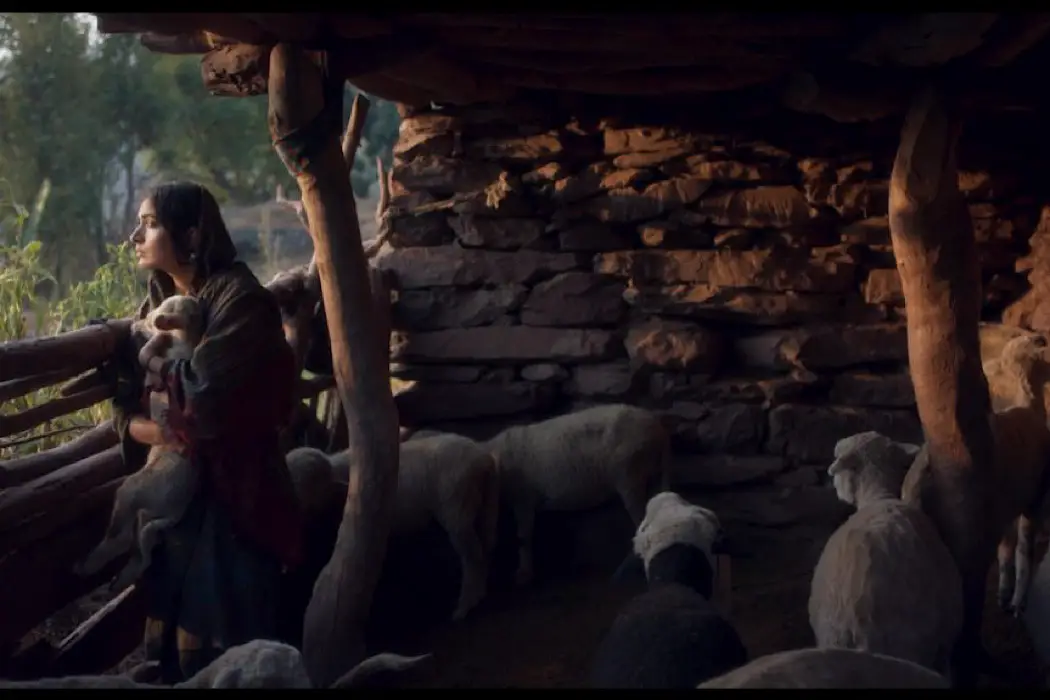THE SHEPHERDESS AND THE SEVEN SONGS: A Fiery Feminist Folk Tale

Lee Jutton has directed short films starring a killer toaster,…
The personal and the political are fully intertwined in filmmaker Pushpendra Singh’s fourth feature, The Shepherdess and the Seven Songs, which begins a weeklong run at New York’s Museum of Modern Art on January 12. Adapted from a story by acclaimed Rajasthani author Vijaydan Detha—making it the second of Singh’s features to draw upon Detha’s work—the film mixes the magic of centuries-old folklore with the modern realities of human migration. The result is a visually stunning tale of feminine defiance in the face of patriarchal power that deserves to be seen on a big screen.
Breaking Chains
Organized in seven chapters based around the songs referenced in the film’s title—from the Song of Marriage to the Song of Regret to the Song of Renunciation—The Shepherdess and the Seven Songs tells the story of Laila (Navjot Randhawa), a beautiful young woman of the nomadic Gujjar-Bakarwal tribe whose hand is sought in marriage by a shepherd named Tanvir (Sadakkit Bijran). The film’s early scenes, which show Tanvir partaking in a traditional challenge to show he is worthy of Laila’s hand, followed by their marriage ceremony, look and feel as though they could have taken place at any time, even in the distant past. It’s only when we see Laila leading a herd of sheep down a modern highway that one realizes this is a story of the here and now.

The local authorities in the Jammu and Kashmir region where the film takes place—an area whose very existence is the subject of conflict—are already a thorn in the side of the Gujjar-Bakarwal, attempting to control their movements and constantly demanding to inspect their identity papers, but when they lay eyes on Laila, a new type of danger is introduced into the mix: lust. Her unparalleled beauty, combined with a sharp and spiky attitude that leads others to call her a tigress, makes her an object of desire to almost every man around.
Mushtaq (Shahnawaz Bhat), the second-in-command to the local police chief, is particularly drawn to Laila. At first, she refuses his advances, but soon, frustrated by her husband’s inability to protect her from other men, she begins making plans to secretly meet with Mushtaq at night. Each time, Laila lies awake in bed, trying to decide whether or not to go through with the meeting, before eventually awaking Tanvir and summoning him to join her outside under the pretext of catching a thief or some other quickly concocted lie. The awkward comedy that ensues when Mushtaq must make polite excuses to Tanvir for his presence in their orchard or their barn carries with it a palpable sense of tension; after all, who knows what would happen to Mushtaq, or Laila, if Tanvir discovered the truth?
Get Free
Singh uses the framing of a folk story to highlight injustices that are all too real in today’s world, whether it be the oppressive enforcement of borders or the treatment of women as mere objects of male desire. As a wife in a traditional society, and a minority in a heavily controlled region, Laila’s very identity is a cage in which she paces back and forth, searching for an escape. The only means she has of taking control of her own life and finding some sort of freedom is by playing these twisted games with the men around her; she is indeed like a tigress, toying with her prey while waiting for an opportunity to strike the final blow. Eventually, she has no choice but to try and abandon her identity entirely—powerfully signified by the Song of Renunciation—and become something new, like a snake shedding its skin. Watching her do so during the film’s mystical climax is gloriously satisfying.

Navjot Randhawa brings a fiery spirit—not to mention an almost otherworldly beauty—to the role of Laila; it’s all too easy to understand why every man within a certain radius would be drawn to her. The lush cinematography of Ranabir Das and the evocative score of Naren Chandavarkar and Benedict Taylor combine to create a remarkable setting for Laila’s story, one in which it feels as though there is an undercurrent of magic constantly running beneath the surface and thus anything could happen. In being based around the titular songs, the film has an episodic quality that only adds to the hazy, dreamlike nature of the plot; we jump from song to song, skipping the empty space in between and the events that may have taken place there. Yet that sense of unknowing only adds to the beauty of the story; like the best fairy tales, not everything can be easily explained away.
Conclusion
Allow yourself to be transported by the sights and sounds of The Shepherdess and the Seven Songs and you’ll be rewarded with a powerful cinematic experience.
What do you think? Have you seen any of Pushpendra Singh’s previous films? Share your thoughts in the comments below.
The Shepherdess and the Seven Songs begins a weeklong engagement at New York’s Museum of Modern Art on January 12, 2022. It will be released on VOD in North America in spring 2022.
https://vimeo.com/642196803
Watch The Shepherdess and the Seven Songs
Does content like this matter to you?
Become a Member and support film journalism. Unlock access to all of Film Inquiry`s great articles. Join a community of like-minded readers who are passionate about cinema - get access to our private members Network, give back to independent filmmakers, and more.
Lee Jutton has directed short films starring a killer toaster, a killer Christmas tree, and a not-killer leopard. Her writing has appeared in publications such as Film School Rejects, Bitch: A Feminist Response to Pop Culture, Bitch Flicks, TV Fanatic, and Just Press Play. When not watching, making, or writing about films, she can usually be found on Twitter obsessing over soccer, BTS, and her cat.













